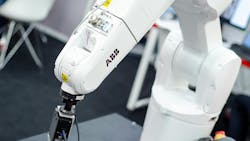ABB to Sell Robotics Division to SoftBank for $5.3B, Weeks After LandingAI Investment
Key Highlights
- ABB sells its Robotics division to SoftBank for $5.3 billion, with the deal expected to close in late 2026.
- The sale reflects ABB's strategic shift away from robotics to focus on electrification, process automation, and digitalization.
- SoftBank aims to integrate ABB's robotics expertise into its 'Physical AI' initiatives, expanding its industrial AI footprint.
- The move marks a significant shift in the industrial robotics landscape, with ABB exiting a sector it helped define.
In a surprising move, ABB announced that it's selling its Robotics division to SoftBank Group for $5.3 billion, leaving a business that has long been a cornerstone of its automation strategy.
The decision comes less than a month after ABB publicized a new investment in LandingAI, a California-based company whose visual AI platform, LandingLens, aims to make ABB's robots easier to train, deploy, and adapt to new tasks. And the company described it as a major step forward for its robotics technology.
Now, the company is preparing to exit the robotics space entirely.
From AI Expansion to Full Exit
ABB's collaboration with LandingAI is designed to reduce robot vision training and deployment time by up to 80%, letting users retrain AI models for new tasks without needing any AI expertise. The company described it as "a critical step in scaling robot adoption," touting itself as "the only robotics company offering a fully integrated AI training tool within its software suite."
The sale, coming just weeks later, is a bit of a surprise to the industry.
ABB said in its statement about the sale that there are "limited business and technology synergies" between robotics and the rest of its portfolio, suggesting that the division no longer fits its broader goals in electrification and process automation. The Robotics division generated $2.3 billion in revenue in 2024, about 7% of ABB Group's total, with an EBITA margin of 12.1%. That's solid performance but not very strong compared to ABB's other businesses, which may explain why the company decided to cash out.
While the AI investment suggested a deeper commitment to robotics, ABB's financials and recent commentary tell a more nuanced story.
While the timing of the sale following the ABB–LandingAI investment feels abrupt, ABB's own Q2 2025 financial report hints that the Robotics division was under pressure. The company posted growth overall—16% order intake and 8% revenue growth, with operational EBITA margins of 19.2%—but noted that its Robotics & Discrete Automation segment was facing challenges tied to its Machine Automation arm and a weaker backlog than the previous year.
ABB also stated that it intended to spin off its Robotics business into a separate company in 2026, showing that this divestment was planned for some time.
So, the SoftBank sale may be a culmination of strategic pressures and diminishing returns in that business unit, combined with the chance to extract as much value as possible. SoftBank's offer—valuing the division at around double its annual revenue—was likely too attractive to refuse. The deal is expected to close in mid-to-late 2026, pending regulatory approval.
Industry analysts say the valuation makes sense in the current market. Samantha Mou, a senior analyst for industrial robotics at Interact Analysis, noted that the deal implies a FY24 EV/EBITDA multiple of 17.2x, "broadly in line with other major industrial transactions…SoftBank is paying a modest premium—negligible given the current AI robotics hype cycle."
Mou added that the long-term costs of AI-driven robotics may have influenced ABB's decision to sell: "The substantial long-term R&D costs may be a key factor behind ABB's decision to sell its robotics business."
Leadership Changes and Reorganization
The sale will also reshape ABB's structure, with its current Robotics & Discrete Automation business being dissolved. The Machine Automation division, currently part of the Robotics & Discrete Automation business, will move under ABB's Process Automation segment, while Robotics transitions to SoftBank.
As part of the change, Sami Atiya, head of the Robotics & Discrete Automation business and a key architect of ABB's robotics strategy, will step down at the end of 2025 and leave the company in 2026 after helping transition the business over to SoftBank.
A Shift in the Automation Landscape
ABB's CEO Morten Wierod called SoftBank "an excellent new home for the business and its employees," highlighting shared ambitions around AI-based robotics. SoftBank CEO Masayoshi Son described the acquisition as part of the company’s push into what he calls "Physical AI," combining artificial intelligence with robotics and next-generation computing.
The sale is a significant change for the industrial robotics landscape. ABB, long seen as one of the world’s leading robot manufacturers alongside FANUC, Yaskawa, and KUKA, is effectively exiting the field it helped define.
The company will now focus on its core strengths of electrification, process automation, and digitalization, where it has recently invested heavily in new manufacturing plants. In return, SoftBank gains a rare foothold in industrial robotics and the manufacturing sectors ABB helped build.
Whether ABB's timing reflects strategic foresight or a missed opportunity remains to be seen, but it underscores how quickly priorities are shifting across industrial automation.
About the Author
Laura Davis
Editor-in-Chief, New Equipment Digest
Laura Davis is the editor in chief of New Equipment Digest (NED), a brand part of the Manufacturing Group at EndeavorB2B. NED covers all products, equipment, solutions, and technology related to the broad scope of manufacturing, from mops and buckets to robots and automation. Laura has been a manufacturing product writer for eight years, knowledgeable about the ins and outs of the industry, along with what readers are looking for when wanting to learn about the latest products on the market.
